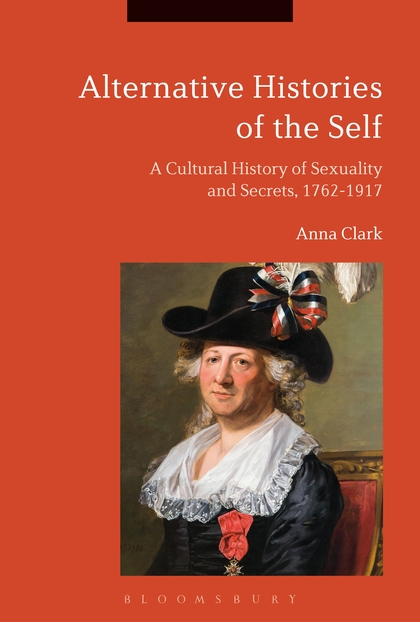Anna Clark
Alternative Histories of the Self: a Cultural History of Sexualities and Secrets is about five unique people and how they developed a sense of self that reconciled their sexual nonconformity with their ethical standards. People will want to read this book because these are fascinating, puzzling people with secret private lives they tried to understand in creative ways.

NOTCHES: What drew you to this topic?
Clark: I began this project writing about Anne Lister, the nineteenth-century diary writer (and subject of the recent TV series Gentleman Jack). My interest in her in part grew out of frustration with the prevalent ideas about identity and the history of sexuality—correctly, historians and critics were arguing that lesbian identities were not biological, that they were culturally constructed. But how could you develop an identity in the absence of cultural constructions around it? I examined what Anne Lister read and wrote in her diaries to explore how she creatively put together a sense of self with the cultural discourses available to her, such as the classics and Romantic novels, as well as her material circumstances (her wealth and social status) and her personality (strong and manipulative). I argued that Anne Lister created a lesbian identity before the word for it.
However, I was still engaged in what Laura Doan calls a ‘queer genealogy’, tracing the precedents for lesbian identity. In my subsequent work, I moved away from the question of identity to examine the dominant and oppositional discourses about sexuality in the context of their own times, as in my book Desire: A History of European Sexuality and other works that focused on the broad sweep of European politics and social movements. In the course of my research, I came across several other individuals with peculiar personalities who did not conform to the sexual norms of their times, including the Chevalier/e d’Eon, a diplomat who became a woman, and Edith Lees Ellis, a lesbian writer married to the sexologist Havelock Ellis. I decided that looking at these individuals raised different questions and required a different methodology. Instead of looking at identities, I concentrate on how my subjects took up or rejected the notion of the unique self. The book explores how my subjects engaged in “queer reading” to interpret canonical writings and twist them from their own original meaning to provide new insight into their own subjectivity.
For instance, both Anne Lister and the Chevalièr/e d’Eon drew on the notion of the unique self that was largely invented by the philosopher Rousseau. They quoted his declaration that ‘I know my heart, and have studied mankind; I am not made like any one I have been acquainted with, perhaps like no one in existence’. However, Rousseau was notoriously conventional in his views of women, admonishing them to be feminine and flirtatious. He certainly would not have approved of the rather masculine Anne Lister or the Chevalièr/e d’Eon’s journey from masculinity to femininity. However, both Anne Lister and the Chevalièr/e d’Eon used this philosophy to justify their sexual or gender nonconformity as natural. But in doing so, they were not necessarily asserting a sexual or gender identity in common with others, but defining themselves as singular and unique. Similarly, while Edith Lees Ellis lived in the time when the modern identity of the lesbian was emerging, in part from the writings of her husband Havelock Ellis, her identity as a lesbian is not the most interesting thing about her. Instead, I show how Edith Ellis twisted the discourses of sexology and eugenics to defend the “abnormal” and “invert” as a potential genius. Most notably she drew on the philosopher Nietzsche—again a notorious misogynist—to argue that the creative power of the “abnormal” should be celebrated, not condemned by society.
Two of my subjects rejected the notion of the unique self, however. Instead, they thought the self should be subsumed for the good of larger social systems. They both arguably used this notion of queer reading to criticize the dominant norms of their time. For instance, James Hinton, a Victorian doctor, publicly advocated service to others and privately advocated polygamy. In the book, I ask whether men such as Hinton, who engage in non-marital sex with women, can be considered queer or sexually transgressive.
NOTCHES: This book is clearly about the history of sex and sexuality, but what other themes does it speak to?
Clark: The book touches on issues of race and imperialism. For instance, my chapter on Anne Lister contains a new analysis of Anne Lister’s first lover, Eliza Raine, a half-Indian heiress, who despaired when Anne abandoned her and their social circles hurled racist abuse at her; she spent the rest of her life in a lunatic asylum. Another subject is Richard Johnson, an 18th century East India Company official who secretly criticized the British Empire in his journals and kept two Indian mistresses.
NOTCHES: How did you research the book?
Clark: Private writings are quite challenging since they are often stream of consciousness and unedited; reading them often requires hours of tedium to find jewels of insight. I remember spending a day decoding one of Anne Lister’s diary entries, only to find that it concerned wearing a pink nightdress to bed and suffering from a cold, rather than any exciting sexual revelations. To understand James Hinton, I had to wade through his jumbled musings about sex, religion, philosophy, art, and mathematics in five manuscript volumes with no discernible order. Richard Johnson’s diaries had no name on them, and it took some detective work to find their true author.
NOTCHES: Whose stories or what topics were left out of your book and why? What would you include had you been able to?
Clark: I would love to find the diaries and journals of a working-class person or Indian person who was a sexual nonconformist. I have written extensively about working-class lives in my book The Struggle for the Breeches but this required different sources that rarely reflect inner subjectivity, although one can find much evidence of working-class men and women’s opinions about sex, politics, work, and family life.
NOTCHES: How do you see your book being most effectively used in the classroom? What would you assign it with?
Clark: This book could be used in history of sexuality courses as well as courses on memoir, autobiography and life writing. I think the case studies of individuals would be particularly interesting because students are trying to figure out their own self conception, often rejecting conventional gender and sexual roles. This would give them an awareness that they can’t simply project their own struggles onto the past—they have to understand the cultural context of the past. I would assign Alternative Histories with Laura Doan’s Disturbing Practices, as she criticizes the genealogical mode of much queer history.
NOTCHES: Why does this history matter today?
Clark: Anne Lister has been in the news a great deal with the series Gentleman Jack (HBO and BBC); it is largely true to her diaries with some exceptions, and conveys her personality, although it makes her nicer than she actually was. The recent debate on Anne Lister’s plaque in York—should she be commemorated as gender non-conforming or as a lesbian?—shows that these issues are alive and well. The Chevalièr/e d’Eon continues to be relevant for trans people.
NOTCHES: Your book is published, what next?
Clark: The new edition of Desire: A History of European Sexuality, has just been published by Bloomsbury. It emphasizes issues of race, imperialism, and trans issues even more than the first edition, with a new chapter on modern imperialism. I am also working on a larger project called “Rage against the Machine: Rethinking Individualism in the British Empire,” that looks at resistance to biopolitical institutions in Ireland, New Zealand, and India.
 Anna K. Clark is a Professor of History and holder of the Samuel Russell Chair in the Humanities at the University of Minnesota. She is currently an editor for the Journal of British Studies and editor foremost for the American British Studies Journal. She is author of: Desire: The History of European Sexuality; Scandal: The Sexual Politics of the British Constitution; and The Struggle for the Breeches: Gender and the Making of the British Working Class. Her current ongoing research is tentatively titled Engendering the British State and focuses on imperialism, the franchise, and criminal law in nineteenth-century British imperial history.
Anna K. Clark is a Professor of History and holder of the Samuel Russell Chair in the Humanities at the University of Minnesota. She is currently an editor for the Journal of British Studies and editor foremost for the American British Studies Journal. She is author of: Desire: The History of European Sexuality; Scandal: The Sexual Politics of the British Constitution; and The Struggle for the Breeches: Gender and the Making of the British Working Class. Her current ongoing research is tentatively titled Engendering the British State and focuses on imperialism, the franchise, and criminal law in nineteenth-century British imperial history.

NOTCHES: (re)marks on the history of sexuality is licensed under a Creative Commons Attribution-NonCommercial-NoDerivatives 4.0 International License.
Based on a work at www.notchesblog.com.
For permission to publish any NOTCHES post in whole or in part please contact the editors at NotchesBlog@gmail.com




